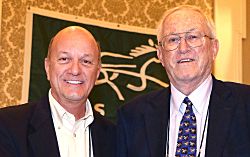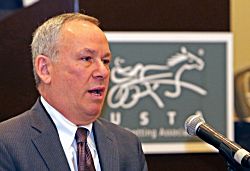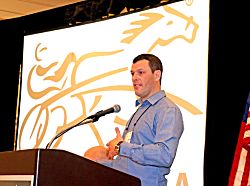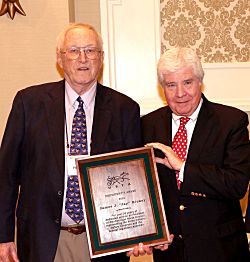General session kicks off USTA Board of Directors meeting on Sunday
February 28, 2016,by T.J. Burkett, Executive Editor, Hoof Beats Magazine
Columbus, OH — The USTA donated $10,000 to the fight against decoupling in Florida and a challenge to the election of track directors in Ohio was defeated during the general session of the USTA Board of Directors Annual Meeting Sunday (Feb. 28) at the Hilton-Easton.
Chairman Ivan Axelrod opened the session by asking for a moment of silence for Walter “Boots” Dunn, the longtime USTA District 7 director who died on Feb. 3. He was replaced on the board by Rich Gillock, a trainer and president of the Meadows Standardbred Owners Association.

USTA President Phil Langley (right) presented a $10,000 check to Florida Standardbred Breeders and Owners Association President Joe Pennacchio to aid in the effort to oppose decoupling in Florida.
During his address to the board, President Phil Langley gave his comments on new and ongoing issues within the industry. He turned over the dais to Joe Pennacchio, District 6 director from Florida, who educated the board about the decoupling issue in his state.
Pennacchio explained that there are separate bills in the Florida House and Senate and that the House bill allows for suspension of racing by casinos for a year. After the first year, the casinos will be able suspend racing for a second year. At the end of 24 months of suspended racing, the license permanently expires.
“There is only one harness racing permit in Florida,” said Pennacchio. “If it expires, there will never be harness racing south of Maryland and Kentucky again.”
The current legislation, which is a larger gaming bill involving an agreement with the Seminole Indian tribe in Florida, has already been passed by both a Senate and House Committee and has the support of the Governor.
Within the bill is a provision that would allow Florida casinos that currently operate racetracks to separate those two entities and no longer be required to run the racetracks. While there are exceptions in the legislation for two Thoroughbred tracks, Gulfstream Park and Tampa Bay Downs, passage of this into law would lead to the closing of Pompano Park.
Langley said that by the end of March, the USTA-sponsored cobalt study will be completed and passed on to USTA directors.
An objection to the District 1 (Ohio) track director election was lodged by Northfield Park prior to their Jan. 23 election. The track protested the interpretation of Article 4.05b of the USTA bylaws, which defines the number of votes delegated to each racetrack in a district to elect that district’s two track directors.
The bylaw reads: “Pari-mutuel track members shall be entitled to cast votes on a proportional basis determined in direct relation to total net purses paid by track members in each district during the previous calendar year.
The number of votes to be cast shall be determined as follows:
1. Net purses less than $250,000—1 vote
2. Net purses amounting to between $250,001 and $500,000— 2 votes
3. Net purses amounting to between $500,001 and $1,500,000— 4 votes
4. Net purses amounting to between $1,500,001 and $3,000,000— 6 votes
5. Net purses amounting to between $3,000,001 and $5,000,000— 8 votes
6. Net purses amounting to $5,000,001 and over—10 votes”
Northfield Park ($22.9 million in net purses paid in 2015), Scioto Downs ($15.7 million) and Miami Valley Raceway ($8.3 million) all received 10 votes, while Hollywood Dayton Raceway ($3.5 million paid from January-November 2015) received eight votes.
Luther Heckman, an attorney representing Northfield Park, said that the track believes the vote should be invalidated because a “proportional” number of votes was not delegated to each track since Northfield’s purses paid were so much higher than the other tracks receiving the same number of votes.
“We object to how the votes were counted and how the votes were allocated, not to the people,” said Heckman.

Mark Loewe, vice president of racing operations at Hollywood Dayton Raceway, was added to the USTA board.
A discussion and vote by the full board followed. Thirty-eight directors voted “no,” validating the vote. Three directors voted “yes” and seven abstained. Mark Loewe, vice president of racing operations at Hollywood Dayton Raceway, was added to the board and Stacy Cahill, general manager of racing operations at Scioto Downs, was reelected.
A committee was then formed to examine and update the bylaw.
Rob Key, founder of Converseon, presented the progress and goals of the USTA-sponsored social media marketing plan. He reiterated that this is a turning point for the industry and encouraged the directors to show leadership in supporting funding for 2016.
“I think today is a critical day in the history of the sport,” he said. “Either we move forward and build on top of what we’ve built and improve and scale and work together for the common good. Or we can kill it, and if we kill it I don’t know how we would ever come back from this.”
During his address, President Langley also reminded the board of the importance of approving the $250,000 in funding for the USTA social media marketing plan, which Axelrod said will be voted on separately from the full budget at the final general session on Monday at 11 a.m.
“$250,000 works out to about $16 per member,” said Langley. “We are really not spending that much money to keep the industry going.”

Trainer/driver Anthony MacDonald led the guest speakers by presenting his new fractional ownership group, www.thestable.ca.
Trainer-driver Anthony MacDonald led the guest speakers by presenting his new fractional ownership group, www.thestable.ca. His program is based in Ontario, but he told the board that this program should be adapted in the U.S. as well. He encouraged the board to look at ways to make it easier for fractional ownership participants to be licensed in various jurisdictions.
Jay Hickey, outgoing president of the American Horse Council, and recipient of this year’s USTA President’s Award, gave his annual update of his group’s work on behalf of the USTA in Washington, D.C. He spoke on changes to the tax code; two pending bills regarding federal oversight of Thoroughbred racing regulation; importing and exporting horses; and the work of the Equine Disease Communication Center.
“Movement restriction is one of our worst nightmares,” he said.

USTA/Mark Hall photos
Phil Langley (left) presented the USTA President’s Award to Jay Hickey.
Ed Martin, president of the Association of Racing Commissioners International, spoke passionately about the two bills for federal regulation of racing currently in Congress. He suggested instead that racing commissions work together to build a regulatory consensus that makes sense to all breeds.
“The only way to get a bill about something like this passed in Washington is to go and talk to people that are going to be voting on this and know nothing about the sport and tell them how bad (the sport) is,” he said.
Coverage of the afternoon’s Registration, Driver/Trainer, Regulatory and Pari-Mutuel committees are in a separate article that is available at this link.
— Dan Leary also contributed to this report
- Progress of social media marketing program discussed as USTA Board of Directors Meeting opens (Saturday, February 27, 2016)
The progress of the USTA-led social media marketing program was presented and debated vigorously during the opening day of the USTA Board of Directors Annual Meeting Saturday (Feb. 27) at the Hilton-Easton.
- USTA donates $10,000 to Florida decoupling effort (Sunday, February 28, 2016)
At Sunday’s (Feb. 28) Board of Directors Annual Meeting, USTA President Phil Langley presented a $10,000 check to Florida Standardbred Breeders and Owners Association President Joe Pennacchio to aid in the effort to oppose decoupling in Florida.
- New registration product demonstration highlights Sunday USTA Board committee meetings (Sunday, February 28, 2016)
The demonstration of a new registration product through USTA Online Services highlighted committee meetings on Sunday (Feb. 28) at the USTA Board of Directors meeting at the Hilton-Easton.
- Funding for social media approved as USTA Board Meeting concludes (Monday, February 29, 2016)
Funding for the social media, digital marketing initiative as well as monetary support for major-race television broadcasts were approved at the final general session of the USTA Board of Directors annual meeting Monday (Feb. 29).
